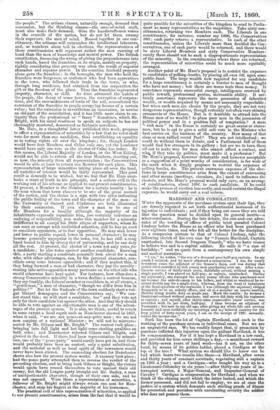HARDSHIP AND CONSOLATION.
WHEN the opponents of the purchase system open their lips, they are fiercely required to set forth authenticated instances of its injustice to individuals ; and if they bring out eases they are told that the question must be decided upon its general merits—a wiser conclusion. During the late debate, the out-and-out advo- cates of the vending of offices of public trust paraded Colonel Lindsay before the House as an officer who had been purchased over eighteen times, and who felt all the better for the discipline. As a companion picture to that of Colonel Lindsay, take the following sketch of his own case by " Francis Haviland, Captain unattached, late Second Dragoon Guards," who we have reason to believe was and is a capital soldier. He calls it " a ease of hardship ; " and we quote from a contemporary his own simple and modest narrative.
"I am," he writes, "the son of a deceased poor half-pay captain. In my youth I enlisted, and by merit obtained a commission. I was for nearly seventeen years the adjutant of the Queen's Bays, and was during that period often mortified by rich young men purchasing over me. After a con- tinuous service of thirty-nine years, faithfully served, without missing a single parade, I was placed on half-pay, as captain, unattached. During my adjutantcy, one amongst the many young officers who purchased over me became the aide-de-camp to his father, and whilst so employed he re- ceived double pay for a single duty, whereas, from the want of subalterns at the head-quarters of the regiment, I was (although the adjutant) obliged frequently to be an orderly officer, and sit as a member on courts-martial, thereby doing double duty on single pay. Mark the results : he became a lieutenant-colonel without purchase, and never did duty with his regiment as captain ; and myself, after thirty-nine consecutive years' service, was rewarded with 7s. per diem, half-pay. I then became an adjutant of Yeomanry ; but now in my old age, after giving my whole life and serving honestly and most faithfully my sovereign and my beloved country for the long period of forty-seven years, I am in the receipt of 1261. annually, minus the income-tax."
Such has been the lot of Captain Haviland, and such is the working of the purchase system in individual cases. But we are an ungrateful race. We too readily forget that, if promotion by purchase inflicted this injustice upon the gallant Haviland, it has its compensations. For if it has kept a Haviland in a low rank, and provided for him seven shillings a day,—a munificent reward for thirty-seven years of hard work—has it not, on the other hand, by means of its golden ladder, placed a Cardigan at the top of the tree ? What system we should like to know can be bad which bears two results like these—a Haviland, after seven and thirty years of constant servitude, vegetating still a captain on 1261. a year ; and a Cardigan—who bought his way up to a Lieutenant-Colonelcy in six years !—after thirty-six years of in- terrupted service, a Major-General, and Inspector-General of Cavalry ? Cardigan is compensation for Haviland ; and when we think of the shining merit which the latter lacked, and which the former possessed, and did not fail to employ, we see at once the justice of a system which demands such sterling proofs of fitness for promotion and punishes with unrelenting severity the soldier who does not possess them.


























 Previous page
Previous page